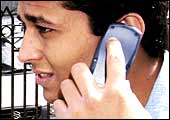|
 Sunil
Mittal just can't stop talking about the "Infosys campus"
he is building. No, the 48-year-old Chairman of Bharti Enterprises
is not getting into the it services business; his reference is
to a model farm the company's agriculture arm, FieldFresh, a 50:50
joint venture with the Rothschild family after which the reticent
financial conglomerate is named (the venture is with ELRo Holdings
India, a company founded by Sir Evelyn and Lady Lynn Forester
de Rothschild), is developing on 300 acres of land in Ladhowal,
Punjab. Instead of arrays of coders, it will have arrays of every
kind of vegetable known to man and then some. "It will be
the best model farm in the country," gushes Mittal. "When
our customers come down (to India), we'll take them there."
And then, in the same breath, "Have you noticed any difference
in the quality of okra you buy in the market?" Sunil
Mittal just can't stop talking about the "Infosys campus"
he is building. No, the 48-year-old Chairman of Bharti Enterprises
is not getting into the it services business; his reference is
to a model farm the company's agriculture arm, FieldFresh, a 50:50
joint venture with the Rothschild family after which the reticent
financial conglomerate is named (the venture is with ELRo Holdings
India, a company founded by Sir Evelyn and Lady Lynn Forester
de Rothschild), is developing on 300 acres of land in Ladhowal,
Punjab. Instead of arrays of coders, it will have arrays of every
kind of vegetable known to man and then some. "It will be
the best model farm in the country," gushes Mittal. "When
our customers come down (to India), we'll take them there."
And then, in the same breath, "Have you noticed any difference
in the quality of okra you buy in the market?"
Ten years after the beginning of the mobile
telephony era, its poster boy, Mittal, also the Chairman and CEO
of Bharti Tele-Ventures in which Bharti Enterprises holds a 45.9
per cent stake, is moving on, part of a journey that he hopes
will create, in another 10 years, a conglomerate "like the
Tata Group or ITC". That doesn't mean he plans to exit telecommunications
altogether, by selling out to a global telco such as Vodafone
that is seeking a toehold in the Indian market. A question on
this has become de rigueur in every interaction Mittal has with
the media; for the record, the answer is "We are not available."
(see "People Like Me Never Retire"). Actually, any company
that acquires Bharti Tele-Ventures will end up with more than
a toehold in the booming Indian telecom market. The telco closed
last year (April 2004-March 2005) with Rs 8,002 crore in revenues
and Rs 1,498 crore in net profits and its July 2004-June 2005
revenues have crossed the $2 billion (Rs 8,800 crore)-mark; in
three months ended June 30, 2005, it registered Rs 2,517 crore
in revenues and earned Rs 510 crore in net profits; at last count,
the company boasted a subscriber base of around 13 million, which
translates into a market share of between 21 per cent and 22 per
cent; and as this magazine goes to press, the Bharti Tele-Ventures'
stock is trading at Rs 319.70, close to its all-time high of Rs
325 (that translates into a market value of Rs 59,890.3 crore
for the company).
 Insurance
& Financial Services Insurance
& Financial Services
PARTNER: AXA Asia Pacific Life Insurance Company
INVESTMENT: Rs 500 crore over two-three years
PLANS: To sell insurance like it has done mobile
telephony services; and across the 5,200 cities and towns
where it has a presence
MITTAL'S TAKE: "Both insurance and telecom
require handling a large number of consumers, both are annuity
businesses and both are highly regulated"
|
 Agriculture Agriculture
PARTNER: ELRo (A Rothschild company)
INVESTMENT: $50 million (Rs 220 crore) over three
years
PLANS: To have some 30,000 acres under cultivation
in the next three years, and grow to at least a billion
dollars (Rs 4,400 crore)
MITTAL'S TAKE: "Ours is a pioneering effort
and it will be big"
|
|
 Airport
Infrastructure Airport
Infrastructure
PARTNER: Changi Airport Managers & Partners
and DLF Universal Limited
INVESTMENT: Project still in bid stage; unlikely
to exceed a few hundred million dollars (Rs 400-600 crore)
PLANS: To make Delhi airport a showpiece with malls,
multiplexes, superior aircraft and passenger handling facilities
and the like, and eventually build airports all over North
India
MITTAL'S TAKE: "If there's some part of the
country's infrastructure that needs to be gold-plated, it
is this"
|
Telecommunications
PARTNER: SingTel
INVESTMENT: Rs 4,000-5,000 crore this year
 PLANS: Continue to explore new price points; grow
the subscriber base to 25 million over the next two-three
years; tap global opportunities if they make sense
PLANS: Continue to explore new price points; grow
the subscriber base to 25 million over the next two-three
years; tap global opportunities if they make sense
MITTAL'S TAKE: "Telecom is no longer just telecom;
there are so many avenues for growth"
|
Agriculture is just one of the businesses
Bharti Enterprises has entered: there's insurance (which will
grow into mutual funds and other financial services), which the
company has entered through a JV with the AXA Group, a $121.6-billion
or Rs 5,35,040-crore (it ranks 13 in Fortune's global 500) French
conglomerate that is the world's largest insurance firm in terms
of revenues; and there's the around $2-billion (Rs 8,800-crore)
project to build a world-class airport in Delhi for which the
government has just called for bids (competition is intense, and
one of the government's key allies wants the entire project scrapped,
but Mittal insists that if Bharti manages to win this bid, it
will move on to building airports in smaller cities). If all goes
well, says Mittal, in 10 years, "less than 50 per cent of
our revenues could come from telecommunications". That could
explain why the man now speaks of okras and social security with
the same passion that he once reserved for all things telecom.
| The Airports Man |
 Rajan
Mittal Rajan
Mittal
Jt Managing Director, Bharti Enterprises
In the next two months, Bharti will know whether the consortium
headed by it and comprising Changi Airport Managers &
Partners, the company that built Singapore's showpiece airport
(it helps that Bharti is a respected name in the city-state;
the Singapore Government-owned SingTel owns a 30.84 per
cent stake in Bharti Tele-Ventures; Changi is also owned
by the Singapore Government), and DLF Universal Limited
has won its bid to build and manage the Delhi airport. Should
that happen, Rajan Mittal, who has hitherto been spearheading
Airtel's marketing initiatives, will find his hands full
managing a $2-billion (Rs 8,800-crore) project. Right now,
he is busy preparing the bid (and is keeping his fingers
crossed).
|
The Right Connection
If there's something that links Bharti's
successful run in telecommunications to its foray into agriculture,
insurance and airport infrastructure (there is), it has to transcend
the significant (but obvious) fact that it is Bharti Tele-Ventures
that has given Bharti Enterprises the financial wherewithal and
the confidence to diversify into new businesses (as also the standing
to attract partners such as the Rothschilds and AXA). This may
be the 2000s and the 1990s' favourite management buzzword, core
competence, may be beginning to look worn, but Mittal himself
has always believed in it. "We have always been very clear
that we will not move away from our core competence," he
says. It's just that he sees Bharti's core competence different
from the way others do. "We have never seen the telecom business
as a technology one," says Akhil Gupta, Jt Managing Director,
Bharti Tele-Ventures, an old-time Bharti hand and a trusted aide
of Mittal who is spearheading the insurance initiative. So, Mittal,
Gupta, and just about anyone else in the senior leadership team
at Bharti see the group's core competence as the ability to manage
annuity-driven services businesses, manoeuvre through regulatory
minefields, and handle a large number of consumers and the consequent
marketing challenges (Bharti Tele-Ventures, for instance, has
a presence in 5,200 towns and cities across India).
| Anything To Do With Numbers |
 Akhil
Gupta Akhil
Gupta
Jt Managing Director, Bharti Tele-Ventures
Some people consider Akhil Gupta the country's best chief
financial officer. It is his ability to raise money at the
right cost at the right time, they say, that has helped
Bharti Tele-Ventures grow into the country's largest and
most efficient mobile telephony company. Gupta, whom Sunil
Mittal credits with the original idea behind outsourcing
everything from network management to IT to customer support,
is involved in each of Bharti Enterprises' new ventures,
and is driving the insurance joint venture. "I am just
learning about the business," he says with trademark
modesty. "He has a couple of very exciting ideas on
how things can be done differently in insurance," counters
Mittal.
|
Then, there's the thing about telecommunications
no longer posing the kind of challenges that excite Mittal. Each
of the new businesses, he admits, does that, and all three, he
claims, have the potential, over time, to grow to be as big as
Bharti Tele-Ventures (It will have 25 million subscribers by 2008,
if not 2007, which will make it among the 10 largest mobile telephony
companies in the world), besides meeting the original objective
of diversification: make more money for Bharti Enterprises than
an incremental investment in the telecom business or in the market
would have. "There is nothing unusual about venturing into
other businesses," says Kishore Chaukar, Managing Director,
Tata Industries. "A good entrepreneur is one who seizes a
business opportunity and it doesn't matter if it is insurance
or telecom or steel."
A Green Thumb
If you are from Punjab, it is inconceivable
that you do not know something about agriculture. Mittal comes
from Ludhiana, an industrial town in the state and that may well
be one reason for his passion for agriculture. "The guiding
thing for us to get into any business is that we should be able
to make a big difference," says Rakesh Bharti Mittal, the
eldest of the three Mittal brothers who own Bharti Enterprises,
the company's Vice Chairman, and the driving force behind FieldFresh
Foods Private Limited (the Mittals are a unique business family
in that they do not seem to believe in primogeniture as far as
management responsibilities are concerned). "Agriculture
has the potential to change the face of the country." FieldFresh
has some 850 acres under cultivation, will focus exclusively on
fruits and vegetables (it has exported some consignments; been
forced, by logistical constraints to release most of its produce
locally; but as Sunil Mittal cheerfully says, it's al |

